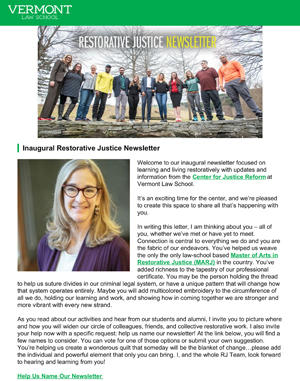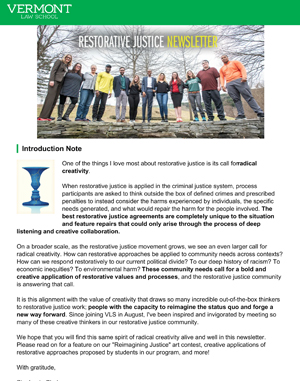An official statement from Vermont Law School President and Dean Tom McHenry:
VTDigger published an article on Sunday that focused on the restructured contracts for tenured professors at Vermont Law School. Though I am unable to comment specifically on personnel matters—for reasons of confidentiality that also benefit our faculty, and which many faculty members requested—there are some aspects of the article that are misleading and demand an official response.
First, let me be clear: this programmatic restructuring is not an attack on tenure or on academic freedom. Salary cuts and renegotiated contracts have impacted faculty members across all categories, including tenured, long-term contract, short-term contract, and adjunct. We made the financial decisions necessary to best serve our students, and students will continue to be taught by tenured, long-term contract, short-term contract, and adjunct professors. Academic freedom has and will always be protected at Vermont Law School.
Second, most of the faculty who have agreed to restructure their contracts will continue teaching at Vermont Law School. Our course offerings will remain essentially the same, with a typical number of classes added and dropped from the catalog.
Finally, the administration provided information to and consulted with faculty members for months leading up to the restructuring decisions. Since last October, the administration provided detailed information about the budget and asked the faculty for proposals and for voluntary commitments. While some faculty members agreed to make some voluntary commitments, they were not sufficient to deliver the necessary cost savings. In addition, salary reductions alone would not realize the necessary savings. Additionally, over the course of the year the Dean’s Advisory Committee, an elected faculty body, held open meetings and office hours to provide an opportunity for the faculty to give feedback in a smaller setting. In the spring, the Dean’s Advisory Committee, held open faculty meetings, in addition to office hours, specifically to solicit feedback and suggestions for criteria to be used by the administration in the restructuring. The administration then solicited feedback on draft criteria in a faculty meeting. Following this meeting, every member of the Dean’s Advisory Committee held another round of office hours to allow faculty members the opportunity to provide anonymous feedback on the proposed criteria. Collectively, this feedback informed the decision-making process and the criteria used by the administration were the same as those that had been shared with the faculty.


















